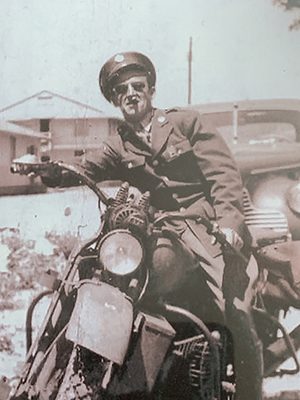[ccfic caption-text format="plaintext"]
By Linda Thomas
Hometown Weekly Correspondent
PFC Armand DuBois, a 25-year-old 60mm mortar gunner, found himself lying on a bunk in an underground cell in an old French prison in August 1944, contemplating his shattered right arm. The pain felt like he had been slammed with a baseball bat.
D-Day was only a couple months earlier, and the landing of Allied troops to liberate France was already history.
But Allied forces were still being fed into France for the push into Germany.
On August 2, DuBois had orders to head out to Brest, France, a port in Brittany. He rode in a jeep with his radioman and driver. In front were three other soldiers in an armored car, and leading the group was a jeep carrying the colonel, his radioman and driver. Other American soldiers followed behind.
They started at midnight.
The ride seemed to go well, a pleasant trip through the French countryside. The journey was supposed to be safe, but the Germans, despite being in disarray, still resolved to fight zealously.
By morning, the soldiers had reached the coastal town of Dinard. All of a sudden, there was a barrage of gunfire. The men were under attack, seemingly from all directions. The armored car was hit and went up in flames. Two soldiers were killed. The third fell out of the car, his legs nearly blown off.
“We asked the colonel, who was shot in the wrist, to put him out of his misery,” DuBois said. “But he didn’t. The Germans did.”
At 7:00 a.m., DuBois felt the bullet hit him in the right arm, rendering it useless.
DuBois and two other soldiers managed to take cover in a ditch. When the fighting stopped, nearly 30 American soldiers lay dead. The rest retreated. It didn’t take long for the Germans to find him and six other survivors, three of them wounded.
“They told us to come out of the ditch and asked us to raise both hands,” he said. “I could only raise one. I think they got the idea what was wrong.”
Now, 75 years later, DuBois sits in the den of his Walpole home with flashes of his war experience as a soldier and prisoner.
“I told my kids I’m going to live in this house ’til I’m 100,” which he will on August 11.
“After all,” he smiled, “I’m just a stubborn Frenchman.”
Heading off to fight
DuBois was born on August 11, 1919 in Manchester, New Hampshire, and moved with his family to Lawrence, Massachusetts, where he graduated from Sacred Heart School in 1937. While there, he spoke English in the morning and French in the afternoon.
After high school, he worked in the stock room at the Ritz-Carlton Hotel in Boston’s Back Bay, then transferred as an elevator operator. “I quit that altogether,” he said.
DuBois was 22 that quiet Sunday morning on December 7, 1941, when he heard on the radio that Pearl Harbor was bombed, and thousands of Americans were killed.
“I remember we declared war,” he said, “and felt bad for all those soldiers and sailors who got killed.”
Like millions of others, DuBois soon was drafted to join the fight. On January 26, 1942, he left for Army training, leaving behind his pregnant bride of eight days. His new wife, Mary, didn’t know her husband was leaving to fight in World War II until the day he left. Even to this day, he doesn’t know why he didn’t tell her sooner.
“I just knew Uncle Sam wanted me,” he said, “and the others.”
Prisoner of War
After the attack on the road to Dinard, the six surviving soldiers were taken by the Germans to a nearby town, where they were interrogated. By 5 p.m., DuBois and the other wounded soldiers were taken from the interrogation room to a hospital in Saint-Malo, where the German doctors made a poor attempt to repair his shattered arm.
There, another soldier lay in a bed, burned from head to toe.
The next morning, the Germans loaded DuBois and the other wounded American soldiers by boat to Saint Helier on the island of Jersey.
Jersey, Guernsey and several smaller islands formed the Channel Islands – British possessions not far from the French coast. The islands were the only British soil captured by the Germans following the fall of France in 1940.
They were fortified by the Germans, but held no great strategic value. Consequently, Allied forces decided to bypass them completely, leaving both the German occupiers and the local residents isolated with dwindling supplies. They would remain that way until the end of the war.
And that’s where DuBois would remain.
For seven of the 10 months when DuBois was a prisoner, he was listed as missing in action (MIA) and thought to have been killed in the battle.
The perimeter of the prison camp was surrounded with barbed wire, and simply touching it could set off a mine, he said.
He remembers the food. Soup every day. All kinds. Potato, cabbage, turnip. But mostly the cabbage, staring at the bowl for a few minutes before having to spoon off the dead bugs from the top.
He was hungry, he said, and sometimes would even ask for seconds.
He ate what they gave him and did what he was told. Though forced to live without the freedoms he was defending, he found the will to survive — despite finding every reason not to.
Back home
When the Germans surrendered in May 1945, DuBois and the other prisoners were freed. He was discharged on November 26, 1946.
DuBois came home to his wife, Mary, and their three-year-old daughter, Virginia. A few years later their family grew, welcoming twins Jeanne and Joseph. They settled in Dedham, then moved to Walpole in 1980.
After the service, he worked for the railroad driving a truck and doing other odd jobs. He left the railroad and got a job at the U.S. Postal Service, where he stayed for 23 years driving a truck picking up and delivering the mail to the station. As the children got older, Mary took a job in the claims department at Blue Cross/Blue Shield.
DuBois served one year as commander of the American Ex-Prisoners of War Massachusetts Chapter 1. It gave him a chance to meet fellow POW’\s.
“We all knew roughly what it was to be a prisoner.”
And then, once a week for 17 years, DuBois and his wife Mary went to the V.A. Hospital in West Roxbury to serve coffee and dessert to the wounded and sick veterans.
“I would make a chocolate cake and brownies,” he recalls. “And, boy, they would go fast.”
DuBois and Mary were married for 73 years until he lost her on March 14, 2015. Losing her has been tough. But the one consolation are his children, his eight grandchildren and 12 great-grandchildren.
For now, he says he’s enjoying seeing his family and taking his daily walks up and down the sidewalk - out of the driveway, up the next-door’s driveway, where he turns around back home.
“Quite a run,” he jokes. “Maybe I should try for the marathon.”
He went back to Jersey for the first time 25 years ago on the 50th anniversary of liberation.
“A couple of other guys that were POWs went with me,” he said.
“Imagine. We were treated like kings.”
Editor’s Note: Linda Thomas writes for Hometown Weekly Publications, Inc. For comments and suggestions, she can be reached at lindasfaces@gmail.com.


























